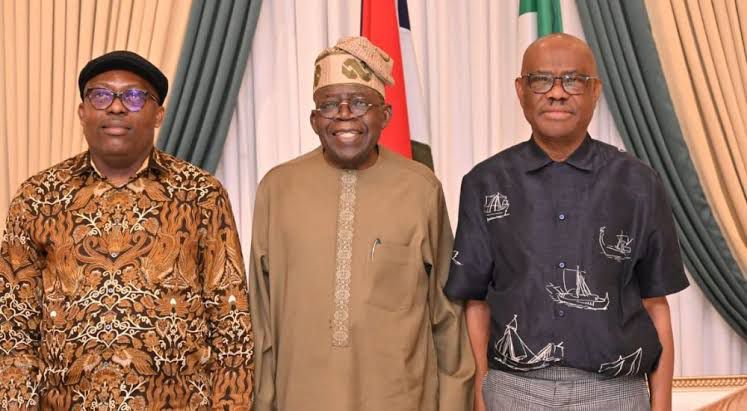
President Bola Tinubu has agreed to reinstate Siminalayi Fubara as the governor of Rivers state — but with the condition that he will not seek re-election in 2027, according to reports.
The truce was reached during a closed-door meeting on Thursday night at the Presidential Villa, where Tinubu hosted Nyesom Wike, minister of the federal capital territory (FCT); Fubara; Martin Amaewhule, the suspended speaker of the Rivers assembly; and a handful of lawmakers.
Presidency sources say the deal, part of a broader effort to restore democratic order in Rivers, involves significant concessions.
According to insiders, one of the key terms is that Fubara will be reinstated to complete his four-year tenure but must forgo any plans to seek a second term in 2027 — a move that will limit his clout but to which he agreed.
A source said, as part of the conditions, Wike would be allowed to nominate all the local government chairpersons across the 23 LGAs of the state.
A source in the presidency said this would serve as significant political leverage, restoring grassroots control to the FCT minister.
Fubara has also agreed to pay all outstanding allowances and entitlements owed to the 27 lawmakers loyal to Wike who were suspended from the state assembly.
In return, the lawmakers will not initiate any impeachment proceedings against him.
The suspended legislators — led by Amaewhule — had defected to the All Progressives Congress (APC) amid the power tussle but continued to lay claim to their seats.
Their status as lawmakers has been a subject of legal and political debate.
Sources described Thursday night’s meeting as a breakthrough in Tinubu’s push to reconcile Wike and the governor — but at the cost of Fubara giving up significant powers in exchange for political survival.
“The arrangement is clear: no second term, no local government control, and peace will return,” the source said.
“The president made it clear that Rivers cannot afford a prolonged crisis. The deal is about restoring calm, but it comes at a steep cost for Fubara,” another source said.
“Wike is the real winner here. By controlling the local government chairmen, he retains significant influence over the state’s political machinery, which will be crucial for 2027.”
THE WIKE-FUBARA FACE-OFF
The political rift between Fubara and Wike, his predecessor, has largely centred on control of the political structure in the oil-rich state.
While Wike has sought to maintain a firm grip on the political machinery he built over eight years in office as governor, Fubara had pushed back to assert his control as governor.
The power struggle triggered a political crisis in the state, destabilising governance, culminating in attempts to impeach Fubara.
Key institutions, including the state assembly, have been caught in the crossfire, with factions aligning with Wike or Fubara.
Previously attempts by Tinubu to broker peace between the two camps hit a brick wall.
Consequently, on March 18, Tinubu declared a state of emergency in Rivers, citing the prolonged political crisis.
He also suspended Fubara, his deputy, Ngozi Odu; and all members of the Rivers assembly for a period of six months.
The president appointed Ibok-Ette Ibas, a retired naval chief, as the state’s sole administrator.
By September, Fubara will have completed his six-month suspension.
The Cable



Discussion about this post